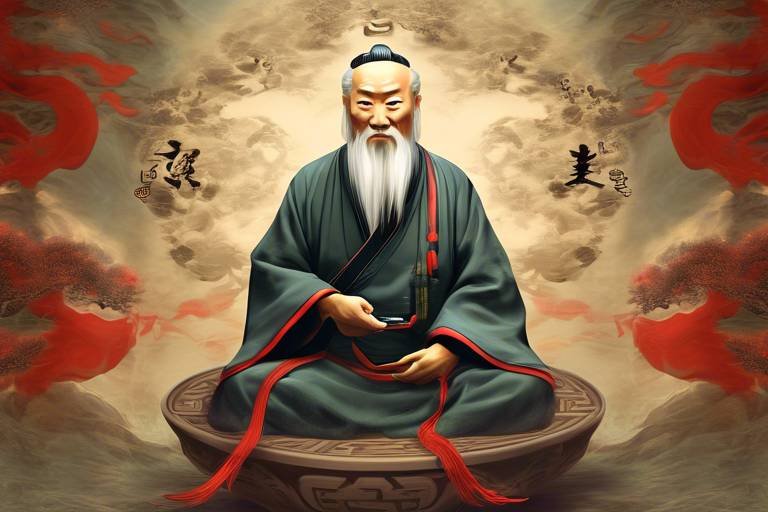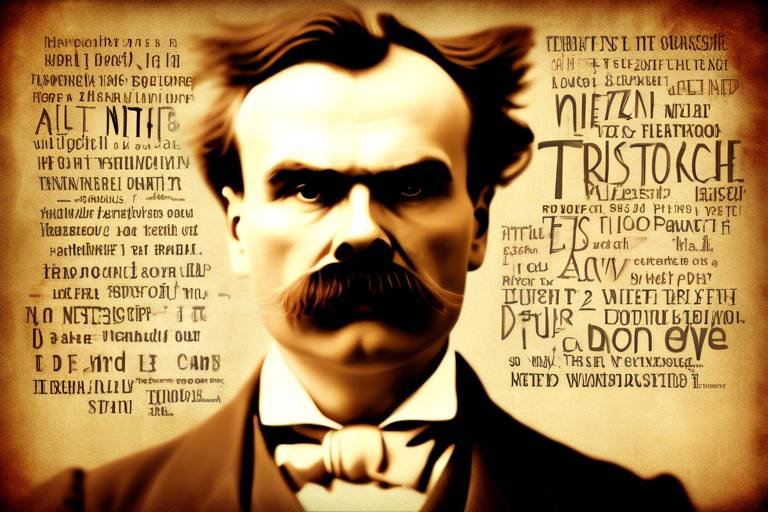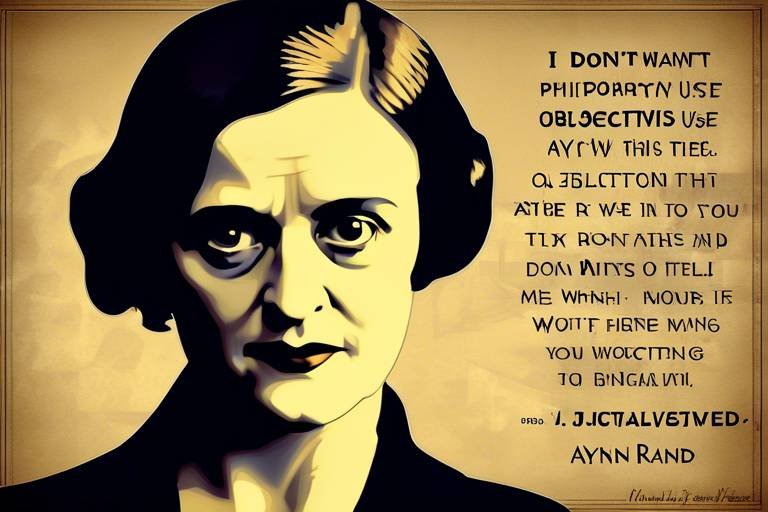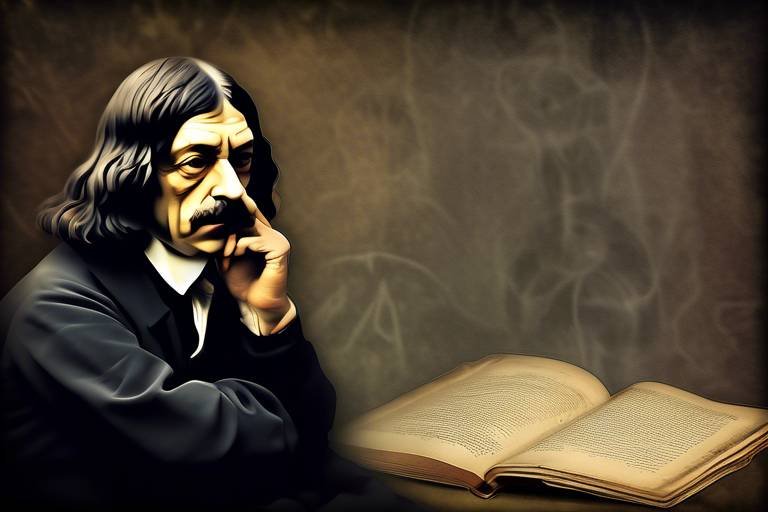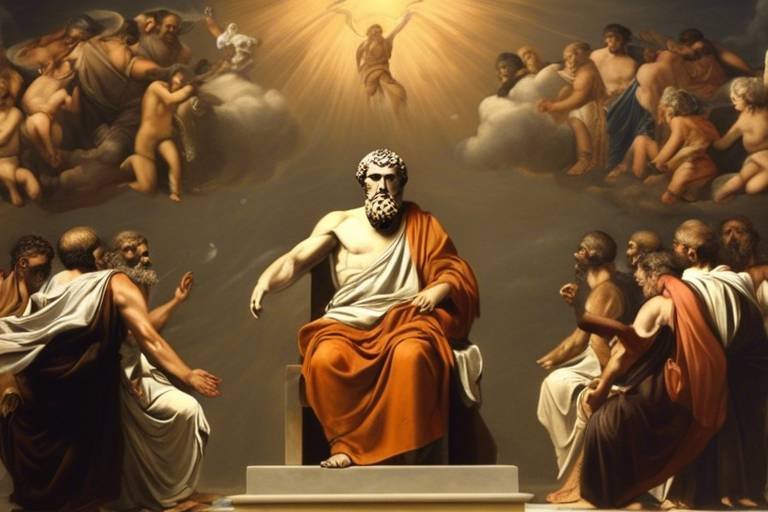Unraveling Daniel Dennett's Views on Consciousness
When it comes to the intricate realm of consciousness, few thinkers have made as significant an impact as Daniel Dennett. This American philosopher, cognitive scientist, and author has dedicated much of his career to unraveling the mysteries of the mind, challenging conventional wisdom, and proposing groundbreaking theories that have reshaped our understanding of consciousness. Dennett's work is characterized by a unique blend of philosophy, science, and an engaging writing style that makes complex ideas accessible to a broad audience. In this article, we will explore Dennett's perspectives on consciousness, delving into his theories, critiques, and the broader implications of his work for understanding the mind and its functions.
At the core of Dennett's philosophy is the belief that consciousness is not a singular, static entity but rather a dynamic and multifaceted phenomenon. He argues that our understanding of the mind must move beyond traditional views that often treat consciousness as a mysterious, almost magical quality. Instead, Dennett invites us to see consciousness as a product of various cognitive processes that work in harmony. His approach is heavily influenced by his background in both philosophy and cognitive science, which allows him to bridge the gap between abstract thought and empirical research.
One of the key themes in Dennett's work is the idea that consciousness can be understood through the lens of evolutionary biology. He posits that consciousness has evolved because it provides adaptive advantages, allowing organisms to navigate their environments more effectively. This perspective not only enriches our understanding of consciousness but also situates it within the broader context of life and evolution, suggesting that our mental faculties are deeply rooted in our biological heritage.
Diving deeper into Dennett's theories, we encounter his challenge to traditional views of consciousness. He proposes that rather than being a singular experience, consciousness is a collection of processes that occur simultaneously. This perspective shifts the focus from a static "self" to a more fluid and dynamic understanding of awareness. Imagine consciousness as a bustling city; each street represents a different cognitive process, all contributing to the vibrant life of the city. Just as a city is not defined by a single building but by the interplay of its many components, consciousness arises from the interaction of various mental processes.
One of Dennett's most significant contributions to the study of consciousness is his Multiple Drafts Model. This model suggests that consciousness does not emerge from a single narrative but rather from multiple parallel processes that compete for our attention. Picture a writer working on a story: instead of crafting a linear narrative, they might draft several versions simultaneously, each with its unique twists and turns. Similarly, our conscious experience is shaped by various drafts of perception and thought that are constantly being edited and revised. This model has profound implications for how we understand human awareness, suggesting that our sense of self is more of a collaborative effort among competing narratives than a singular, cohesive story.
When we consider Dennett's views on consciousness, it naturally leads us to the topic of free will. If consciousness is a dynamic interplay of processes, what does that mean for our ability to make choices? Dennett argues that understanding consciousness in this way does not diminish our sense of agency; rather, it enriches it. He suggests that our decisions are influenced by a complex web of cognitive processes, yet we still have the capacity to reflect, deliberate, and ultimately choose. This perspective offers a refreshing take on free will, positioning it not as an absolute power but as a nuanced capability shaped by our mental architecture.
Dennett also takes a critical stance against Cartesian dualism, the philosophical idea that mind and body are separate entities. He argues that this perspective is not only outdated but also counterproductive to understanding consciousness. By separating the mind from the body, Cartesian dualism creates a false dichotomy that hinders scientific exploration. Dennett's critique emphasizes the importance of viewing consciousness as an integral part of our biological existence, rather than as an ethereal quality detached from our physical being.
Linking consciousness to evolutionary biology is another cornerstone of Dennett's philosophy. He posits that consciousness has evolved as an adaptive trait, enhancing our ability to survive and thrive in complex environments. This evolutionary perspective provides insights into how consciousness may have developed across different species, suggesting that while human consciousness is unique, it shares common roots with the cognitive abilities of other animals. Understanding these connections not only deepens our appreciation for the complexity of consciousness but also highlights the shared cognitive experiences that bind us to other forms of life.
Despite his influential theories, Dennett's ideas have not gone unchallenged. Critics from various philosophical backgrounds have raised questions about his interpretations and conclusions. Some argue that his views oversimplify the complexities of consciousness, while others believe that his evolutionary approach may overlook the subjective nature of experience. These critiques have sparked ongoing debates in the field, demonstrating that the study of consciousness remains a vibrant and contentious area of inquiry.
In response to his critics, Dennett has continually refined his arguments and clarified misconceptions. He emphasizes that his theories are not meant to provide definitive answers but rather to stimulate discussion and exploration. By engaging with opposing viewpoints, Dennett has evolved his thought, illustrating the dynamic nature of philosophical inquiry. His willingness to adapt and reconsider his positions speaks to the strength of his intellectual rigor and commitment to understanding consciousness.
Lastly, Dennett's ideas have profoundly influenced the field of cognitive science. His theories have shaped research on the relationship between consciousness, cognition, and artificial intelligence, prompting scientists and philosophers alike to reconsider how we define and study the mind. Dennett's interdisciplinary approach has fostered collaborations across fields, encouraging a more integrated understanding of consciousness that encompasses both philosophical and scientific perspectives.
- What is Daniel Dennett's main contribution to the philosophy of mind?
Dennett is known for his Multiple Drafts Model of consciousness, which proposes that consciousness arises from various parallel processes rather than a singular narrative. - How does Dennett view free will?
He believes that understanding consciousness as a dynamic interplay of processes enhances our sense of agency rather than diminishes it. - What critiques does Dennett face regarding his theories?
Critics argue that his views may oversimplify consciousness and that his evolutionary perspective might overlook the subjective experience. - How has Dennett influenced cognitive science?
His theories have shaped research on consciousness and cognition, fostering interdisciplinary collaborations and discussions.

Introduction to Dennett's Philosophy
When we dive into the world of philosophy, few names stand out as prominently as Daniel Dennett. Known for his engaging and often provocative ideas, Dennett has made significant contributions to our understanding of consciousness and the mind. His work challenges conventional wisdom, urging us to rethink what we believe about our own mental processes. But what exactly are the key themes that characterize Dennett's approach?
At the core of Dennett's philosophy lies a rejection of the traditional notion of consciousness as a singular, static entity. Instead, he views consciousness as a dynamic, ever-evolving phenomenon. This perspective is not just a theoretical abstraction; it has profound implications for how we understand ourselves and our place in the world. Dennett’s work is deeply influenced by a combination of philosophy, cognitive science, and evolutionary biology, making his insights both rich and multifaceted.
One of the most intriguing aspects of Dennett’s philosophy is his insistence on the importance of processes over fixed states. He argues that consciousness is not something we simply possess; rather, it is something we do. This idea invites us to consider how our thoughts, perceptions, and experiences are interwoven in a tapestry of cognitive activity. To illustrate this, think of consciousness as a theater where various actors (thoughts and perceptions) perform simultaneously, rather than a single spotlight illuminating a solitary actor on stage. This metaphor encapsulates Dennett's view that multiple cognitive processes are happening in parallel, contributing to our overall experience of being aware.
In exploring Dennett's philosophy, it's essential to recognize how it intersects with other areas of inquiry. For instance, his rejection of Cartesian dualism—the idea that mind and body are separate entities—has sparked a re-evaluation of how we think about the relationship between our mental states and our physical existence. Dennett posits that understanding consciousness requires a holistic approach that considers both biological and psychological dimensions.
As we journey through Dennett's ideas, we'll uncover how they challenge us to rethink fundamental questions about free will, the nature of reality, and the evolutionary origins of our cognitive abilities. His work serves as a bridge between philosophy and science, encouraging a dialogue that is as intellectually stimulating as it is essential for grasping the complexities of human consciousness.

The Nature of Consciousness
When we think about consciousness, it's easy to imagine it as a single, glowing light bulb illuminating the dark corners of our minds. However, Daniel Dennett flips this notion on its head, suggesting instead that consciousness is more like a bustling city—full of various processes and interactions that create the vibrant experience we often take for granted. In Dennett's view, consciousness is not a static entity but a dynamic phenomenon, a tapestry woven from countless threads of sensory input, cognitive processing, and emotional response.
To grasp Dennett's perspective, we must first understand that he challenges the traditional idea of consciousness as a singular, unified experience. Instead, he proposes that it is better understood as a collection of processes that operate simultaneously. Imagine a movie being edited in real-time, where multiple drafts are being created and revised. This analogy captures Dennett's view perfectly: our conscious experience is not a final cut but rather an ongoing production, with various scenes being played out in parallel.
In this framework, each process contributes to our overall awareness, and they can influence one another in complex ways. For instance, when you see a beautiful sunset, your emotional response, memories of past sunsets, and sensory perceptions of colors all interweave to create a rich conscious experience. This idea leads us to consider how our understanding of consciousness might change if we view it through this multifaceted lens.
Moreover, Dennett's approach prompts us to rethink the implications of consciousness in our daily lives. If consciousness is a collection of processes, then it raises questions about how we perceive reality and make decisions. Are our choices truly our own, or are they merely the result of various cognitive processes interacting in the background? This perspective opens the door to deeper discussions about free will, agency, and the very nature of what it means to be conscious.
In summary, Dennett's view of consciousness invites us to explore the intricate web of processes that shape our experiences. By understanding consciousness as a dynamic and multifaceted phenomenon, we can appreciate the complexity of the mind and its functions. This shift in perspective not only enriches our understanding of ourselves but also challenges us to reconsider our assumptions about the nature of reality and our place within it.
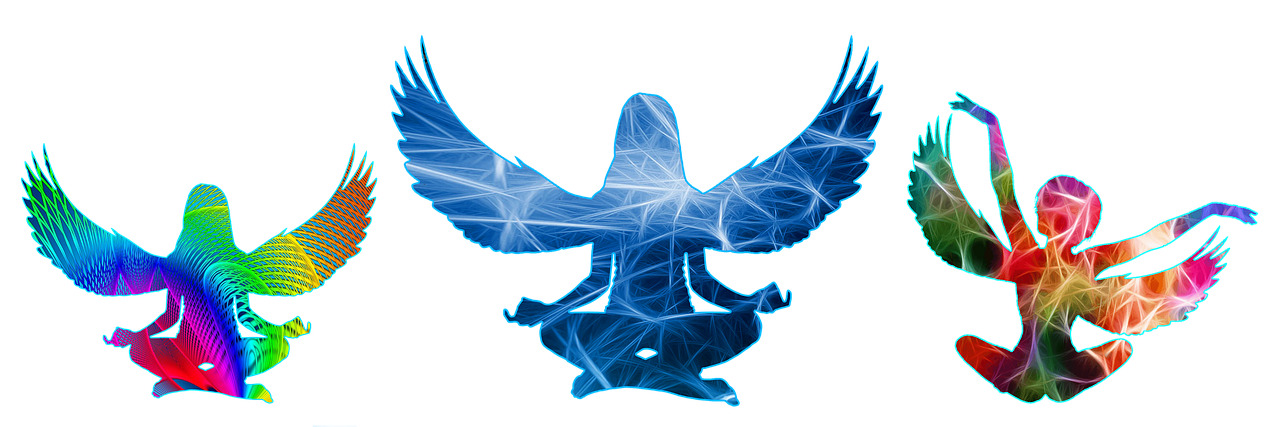
Multiple Drafts Model
One of the most intriguing contributions that Daniel Dennett has made to the philosophy of mind is his of consciousness. This model fundamentally challenges the traditional notion that consciousness is a single, linear stream of experience. Instead, Dennett proposes that consciousness is more like a theater with multiple stages, where various drafts of sensory input are processed simultaneously, rather than sequentially. Imagine a bustling newsroom where different stories are being written at the same time; each reporter (or process) is drafting their narrative based on the same event, but from different angles and perspectives. This analogy captures the essence of Dennett's model.
In the Multiple Drafts Model, consciousness does not emerge from a singular source but rather from a variety of parallel processes that interpret sensory information. These processes compete for our attention, and the ones that are deemed most relevant or interesting are what we eventually become consciously aware of. This leads to a more dynamic understanding of how we experience the world, as our awareness is constantly shaped and reshaped by these competing drafts.
To illustrate this further, consider the following key aspects of the Multiple Drafts Model:
- Parallel Processing: Different aspects of sensory information are processed at the same time, allowing for a rich tapestry of experiences to be woven together.
- Selection and Relevance: Not all drafts make it to our conscious awareness; only those that are perceived as significant or interesting rise to the surface.
- Non-linear Experience: Our conscious experience is not a straightforward narrative but rather a collage of various perceptions and interpretations.
One of the most fascinating implications of this model is how it reshapes our understanding of memory and perception. Rather than viewing memory as a static repository of past experiences, Dennett encourages us to see it as a fluid collection of drafts that are constantly being edited and revised. This perspective not only enhances our comprehension of the mind but also opens up discussions about the nature of reality itself. If our perception is merely a collection of drafts, how can we be sure of what is real? This question invites further exploration into the interplay between consciousness and reality.
Ultimately, Dennett's Multiple Drafts Model serves as a powerful reminder that our conscious experience is not as straightforward as it seems. It challenges us to reconsider our assumptions about how we perceive the world, suggesting that consciousness is a complex, multi-faceted phenomenon that is constantly evolving. As we delve deeper into the workings of the mind, Dennett's insights encourage us to embrace the chaos and complexity of our conscious experiences, illuminating the intricate dance between perception, memory, and awareness.

Implications for Free Will
When we dive into Daniel Dennett's views on consciousness, one of the most fascinating areas of discussion is the . Dennett's perspective challenges the traditional notion of free will as a straightforward, binary concept of "yes" or "no." Instead, he presents a more nuanced view that aligns closely with his understanding of consciousness as a complex interplay of processes. But what does this mean for our day-to-day experiences of making choices?
To grasp Dennett's ideas, we must first acknowledge that he sees consciousness not as a singular, static entity but as a dynamic system that is constantly evolving. This leads to the notion that our decisions are not just the result of a singular conscious thought but rather a culmination of various mental processes that occur simultaneously. Think of it like a bustling city: while you might see a single street, it is actually a network of roads, traffic lights, and interactions that facilitate movement. Similarly, our decisions are influenced by a multitude of factors—past experiences, subconscious cues, and social dynamics—all at play in a vibrant mental landscape.
In Dennett's view, this complexity does not negate free will; rather, it enriches our understanding of it. He argues that free will can be seen as a spectrum of choices influenced by our consciousness's rich tapestry. Instead of being entirely free or entirely determined, our choices exist within a framework of influences and possibilities. This perspective invites us to consider the following:
- Agency exists within constraints: While we may not be free to choose every single aspect of our lives, we still possess the ability to make decisions within the context of our circumstances.
- Informed choices: The more we understand the processes behind our consciousness, the better equipped we are to make choices that reflect our true desires and values.
- Responsibility and accountability: If our choices arise from a multitude of processes, it prompts us to rethink how we hold ourselves and others accountable for actions.
By reframing free will in this way, Dennett encourages a more compassionate understanding of human behavior. Instead of viewing individuals as purely autonomous agents or mere puppets of fate, we can appreciate the intricate interplay of factors that shape our decisions. This perspective not only enriches our understanding of human agency but also aligns with modern scientific insights into psychology and neuroscience.
However, this view is not without its critics. Some argue that if our consciousness is merely a product of various processes, it diminishes the essence of personal choice. They contend that if our decisions are influenced by external factors, can we truly say we are "choosing" at all? Dennett counters this by emphasizing that the very complexity of our mental processes is what allows for a richer, more meaningful experience of choice. Just like a master chef who uses a variety of ingredients to create a unique dish, our consciousness blends various influences to produce decisions that are distinctly ours.
In conclusion, Dennett's insights into consciousness and free will push us to rethink how we perceive our choices. By understanding that our decisions arise from a dynamic interplay of processes, we can embrace a more profound sense of agency that acknowledges the complexity of the human experience. In this light, free will is not an illusion but a vibrant dance of influences that shapes who we are and how we navigate the world.

Critiques of Cartesian Dualism
Daniel Dennett's critique of Cartesian dualism is a cornerstone of his philosophical approach to consciousness. Cartesian dualism, famously proposed by René Descartes, posits that the mind and body are fundamentally different substances. In contrast, Dennett argues that this separation is not only misleading but also detrimental to our understanding of consciousness. He challenges the notion that the mind exists in a realm separate from the physical processes of the brain, suggesting instead that consciousness is deeply intertwined with our biological makeup.
One of Dennett's central arguments is that the dualistic view creates an unnecessary dichotomy that complicates our understanding of mental phenomena. He posits that if we consider consciousness as a product of various cognitive processes rather than a distinct entity, we can better appreciate the complexities of human experience. For Dennett, consciousness is not a solitary "self" residing in the brain; rather, it emerges from a multitude of interactions and functions occurring simultaneously. This perspective allows for a more integrated view of how we perceive the world and make decisions.
To illustrate his critique, Dennett often employs the analogy of a theater. In this metaphor, the mind is likened to a stage where various actors (cognitive processes) perform. Instead of having a single, central actor (the "self") controlling the performance, there are multiple actors contributing to the overall show. This model emphasizes that what we experience as consciousness is a result of many processes working together, rather than a singular, isolated experience.
Furthermore, Dennett argues that Cartesian dualism leads to a series of philosophical problems, such as the "interaction problem." If the mind and body are separate, how do they interact? This question has perplexed philosophers for centuries, and Dennett suggests that abandoning dualism simplifies these discussions. By understanding consciousness as a product of physical processes, we can focus on empirical research and cognitive science to explore how these processes give rise to our subjective experiences.
Critics of Dennett's views often argue that his rejection of dualism overlooks the subjective quality of consciousness—the "what it is like" aspect of being aware. However, Dennett counters that this subjective experience can still be explained within a physicalist framework. He believes that by examining the mechanisms behind consciousness, we can uncover the richness of our experiences without resorting to dualistic explanations.
In summary, Dennett's critique of Cartesian dualism is not merely an academic exercise; it has profound implications for how we understand ourselves and our place in the natural world. By advocating for a view of consciousness grounded in physical processes, Dennett encourages a more nuanced exploration of the mind that embraces complexity rather than oversimplification. This shift in perspective opens new avenues for research and understanding in both philosophy and cognitive science, challenging us to rethink long-held assumptions about the nature of consciousness.

Consciousness and Evolution
Daniel Dennett's exploration of consciousness is intricately tied to the concept of evolution. He posits that consciousness is not just a byproduct of complex brain processes but serves adaptive functions that have evolved over time. This perspective invites us to view consciousness as a tool that has been honed by natural selection, much like physical traits that enhance survival. Imagine consciousness as a finely tuned instrument, crafted through the ages to help organisms navigate their environment more effectively.
In Dennett's view, consciousness allows for a richer interaction with the world, enabling organisms to make better decisions based on past experiences and future predictions. This is particularly evident in social species, where the ability to understand others' intentions and emotions can significantly enhance cooperation and survival. For instance:
- Social Interaction: Consciousness allows for complex social behaviors, which are crucial for survival in many species.
- Problem Solving: The conscious mind enables individuals to solve problems creatively, adapting to new challenges in their environment.
- Learning and Memory: Consciousness plays a vital role in learning from past experiences, which is essential for adapting to changing circumstances.
Moreover, Dennett argues that consciousness is not exclusive to humans. Instead, it exists on a spectrum across various species, with different levels of awareness and cognitive capabilities. For example, while humans may possess a highly developed form of consciousness, many animals exhibit signs of awareness and intentionality that suggest a form of consciousness appropriate to their ecological niches. This evolutionary perspective encourages a broader understanding of consciousness, suggesting that it is a fundamental aspect of life that has emerged in various forms throughout the animal kingdom.
To illustrate this point, consider the following table, which outlines different species and their respective cognitive abilities:
| Species | Cognitive Abilities | Consciousness Level |
|---|---|---|
| Humans | Complex problem-solving, abstract thinking, self-awareness | High |
| Dolphins | Social interaction, tool use, communication | Moderate |
| Crows | Tool making, planning, problem-solving | Moderate |
| Dogs | Emotional understanding, social bonding, learning | Low to Moderate |
This table serves to highlight that consciousness, while varying in complexity, is a trait that has evolved to meet the needs of different species. Dennett's evolutionary perspective on consciousness not only broadens our understanding of the mind but also challenges us to rethink our place within the natural world. By recognizing the evolutionary roots of consciousness, we can appreciate the diverse cognitive landscapes that exist among living beings.
In conclusion, Dennett's connection between consciousness and evolution invites us to consider how our minds have been shaped by the very fabric of life itself. It raises profound questions about the nature of awareness and the evolutionary processes that have led to the rich tapestry of consciousness we observe today.
- What is Daniel Dennett's main argument about consciousness? Dennett argues that consciousness is not a singular entity but a collection of processes that have evolved for adaptive purposes.
- How does Dennett link consciousness to evolution? He suggests that consciousness has adaptive functions that enhance survival and decision-making across species.
- Is consciousness unique to humans? No, Dennett believes that various forms of consciousness exist across different species, each adapted to their ecological needs.

Criticism and Controversies
Daniel Dennett's theories on consciousness have sparked a significant amount of debate and criticism within the philosophical community. While many appreciate his innovative approach, others are quick to challenge his ideas, arguing that they oversimplify the complex nature of consciousness. One of the primary criticisms revolves around his Multiple Drafts Model. Critics argue that by suggesting consciousness is merely a product of various parallel processes, Dennett fails to account for the subjective, first-person experience that many believe is central to understanding consciousness. This perspective, they argue, reduces the richness of human experience to mere cognitive functions, which may overlook essential aspects of what it means to be conscious.
Moreover, Dennett's rejection of Cartesian dualism has also been a point of contention. While he provides compelling arguments against the mind-body separation, some philosophers contend that his materialistic view neglects the qualitative aspects of consciousness, often referred to as qualia. These critics assert that by dismissing qualia, Dennett's theories might miss the profound implications of personal experience, which cannot be fully explained through a purely functional or evolutionary lens.
Another area of controversy is Dennett's stance on free will. His assertion that free will is compatible with a deterministic view of the universe has led to heated debates. Some argue that if our thoughts and actions are merely the result of evolutionary processes and neural mechanisms, then true agency and moral responsibility come into question. This has led to a divide in the philosophical community, with some embracing Dennett's perspective and others vehemently opposing it.
To illustrate the criticisms faced by Dennett, consider the following table that summarizes key critiques of his theories:
| Critique | Description |
|---|---|
| Oversimplification of Consciousness | Critics argue that Dennett's models reduce the complexity of consciousness to mere cognitive processes. |
| Neglect of Qualia | Many believe that by dismissing qualia, Dennett overlooks important aspects of subjective experience. |
| Determinism and Free Will | His compatibility of free will with determinism raises questions about agency and moral responsibility. |
Despite these criticisms, Dennett remains a pivotal figure in the discourse surrounding consciousness. His willingness to engage with opposing views and refine his arguments demonstrates his commitment to the philosophical inquiry. In fact, he often suggests that criticism is not just an obstacle, but a vital part of the intellectual process. As he continues to respond to critiques and adapt his theories, the dialogue around consciousness remains vibrant and dynamic, ensuring that Dennett's work will continue to provoke thought and discussion for years to come.
- What is the Multiple Drafts Model? The Multiple Drafts Model is Dennett's theory proposing that consciousness arises from various parallel processes rather than a singular, unified experience.
- How does Dennett's view relate to free will? Dennett argues that free will can exist within a deterministic framework, suggesting that our choices are shaped by evolutionary processes and neural mechanisms.
- What are qualia? Qualia refer to the subjective, qualitative aspects of conscious experience, such as the redness of red or the taste of chocolate.
- Why do some philosophers criticize Dennett? Critics argue that Dennett oversimplifies consciousness, neglects the importance of qualia, and raises questions about moral responsibility in a deterministic universe.

Responses to Critics
In the vibrant world of philosophy, criticism is as common as the air we breathe. Daniel Dennett, with his groundbreaking views on consciousness, has not escaped this reality. However, rather than retreating in the face of dissent, Dennett has consistently engaged with his critics, refining his arguments and clarifying misconceptions along the way. This approach not only demonstrates his commitment to intellectual rigor but also highlights the dynamic nature of philosophical inquiry.
One of the primary criticisms Dennett faces revolves around his Multiple Drafts Model. Critics argue that this model fails to account for the subjective experience of consciousness. They question whether a mere collection of processes can truly capture the richness of what it feels like to be aware. In response, Dennett has emphasized that his model does not deny the existence of subjective experiences; rather, it reinterprets them. He suggests that these experiences are the result of various cognitive processes working in harmony, much like a symphony where each instrument contributes to the overall sound without being the sound itself.
Furthermore, Dennett addresses concerns regarding the implications of his views on free will. Critics often worry that if consciousness is merely a product of evolutionary processes and cognitive functions, it undermines the notion of agency. Dennett counters this by arguing that understanding the mechanisms behind our choices can actually enhance our sense of free will. He likens it to learning how a magician performs tricks; knowing the mechanics behind the magic doesn’t diminish the wonder, but rather enriches our appreciation of it.
To clarify his stance further, Dennett has engaged in numerous debates and discussions, often inviting his critics to articulate their positions. This openness has allowed him to refine his ideas, ensuring they are robust enough to withstand scrutiny. For instance, he often points out that while critics may draw on traditional views of consciousness, the evolution of scientific understanding necessitates a reevaluation of these perspectives.
Additionally, Dennett's responses often incorporate findings from cognitive science and neuroscience, which bolster his arguments. By integrating empirical evidence with philosophical reasoning, he demonstrates that consciousness is not just a theoretical construct but a phenomenon grounded in observable reality. This interdisciplinary approach not only strengthens his claims but also invites a broader audience to engage with his work.
In light of his responses, it is evident that Dennett’s philosophy is not static; it evolves through dialogue and debate. He embraces criticism as a vital part of the philosophical process, viewing it as an opportunity for growth rather than a setback. This mindset encourages a rich exchange of ideas, fostering a deeper understanding of consciousness and its complexities.
- What is the Multiple Drafts Model?
The Multiple Drafts Model proposed by Dennett suggests that consciousness arises from various parallel processes rather than a single, unified experience. - How does Dennett view free will?
Dennett believes that understanding the processes behind our choices can enhance our sense of agency, rather than diminish it. - What criticisms does Dennett face?
Critics often argue that his theories fail to capture the subjective richness of consciousness and challenge the implications for free will. - How has Dennett responded to critiques?
He engages with critics, refines his arguments, and incorporates findings from cognitive science to strengthen his views.

Impact on Cognitive Science
Daniel Dennett's influence on cognitive science is nothing short of profound. His theories have not only challenged the status quo but have also opened new avenues for research and understanding in the field. By proposing that consciousness is a collection of processes rather than a singular, static entity, Dennett has encouraged scientists and philosophers alike to rethink how they approach the study of the mind. This shift in perspective has led to a more dynamic view of cognitive processes, which can be likened to a symphony where multiple instruments play together to create a harmonious whole.
One of the key areas where Dennett's ideas have made a significant impact is in the realm of artificial intelligence (AI). His insights suggest that understanding consciousness is not just about studying the human mind but also about exploring how machines can simulate cognitive processes. This has sparked debates on whether machines can ever truly possess consciousness or if they merely mimic human-like behaviors. As AI continues to evolve, Dennett’s theories provide a framework for examining the complexities of machine learning and its implications for our understanding of intelligence.
Moreover, Dennett's work has encouraged interdisciplinary collaboration among cognitive scientists, philosophers, and neuroscientists. This collaboration has led to various research initiatives aimed at exploring the intersection of consciousness, cognition, and brain function. For instance, the integration of neuroscience with Dennett's theories has prompted studies that investigate how brain processes correlate with conscious experience. These studies often utilize advanced imaging techniques to observe brain activity while participants engage in tasks that require conscious thought, thus bridging the gap between subjective experience and objective measurement.
To illustrate the impact of Dennett's work on cognitive science, consider the following table that summarizes key areas influenced by his theories:
| Area of Impact | Description |
|---|---|
| Artificial Intelligence | Exploration of machine consciousness and cognitive simulation. |
| Interdisciplinary Research | Collaboration across neuroscience, philosophy, and cognitive science. |
| Neuroscientific Studies | Investigating brain processes associated with conscious experience. |
In summary, Daniel Dennett's contributions to cognitive science have not only reshaped our understanding of consciousness but have also propelled the field into new territories. His advocacy for a process-oriented view of the mind encourages ongoing exploration and debate, ensuring that the study of consciousness remains a vibrant and evolving field. As researchers continue to unravel the complexities of the mind, Dennett's insights will undoubtedly serve as a guiding light for future inquiries.
- What is the Multiple Drafts Model? The Multiple Drafts Model is a theory proposed by Dennett suggesting that consciousness arises from various parallel processes rather than a single, unified experience.
- How does Dennett's work relate to artificial intelligence? Dennett's theories provide a framework for understanding how machines may simulate cognitive processes, raising questions about the nature of consciousness in AI.
- What are the criticisms of Dennett's views? Critics often argue that Dennett oversimplifies the complexities of consciousness and neglects subjective experience.
Frequently Asked Questions
- What is Daniel Dennett's view on consciousness?
Daniel Dennett believes that consciousness is not a singular entity but rather a collection of processes. He argues that it arises from various parallel activities in the brain, challenging traditional notions that view consciousness as a static and unified experience.
- Can you explain the Multiple Drafts Model?
The Multiple Drafts Model proposes that consciousness is formed through multiple streams of information processing occurring simultaneously. Instead of a single narrative, our awareness is made up of many "drafts" that are constantly being edited and revised, leading to a more complex understanding of how we experience the world.
- How does Dennett's philosophy relate to free will?
Dennett's views suggest that free will is more about the processes that lead to our decisions rather than the traditional idea of a singular, autonomous self making choices. His perspective encourages us to think about how our consciousness and decision-making are influenced by various factors, including our biology and environment.
- What critiques does Dennett have against Cartesian dualism?
Dennett critiques Cartesian dualism by arguing that the separation of mind and body is misleading. He believes that mental processes cannot be fully understood without considering their physical basis in the brain, thus promoting a more integrated view of consciousness that aligns with contemporary neuroscience.
- How does Dennett connect consciousness to evolution?
Dennett links consciousness to evolutionary biology by suggesting that it serves adaptive functions. He posits that consciousness has evolved as a tool for survival, enabling organisms to navigate their environments, make decisions, and enhance their chances of reproduction.
- What are some criticisms of Dennett's theories?
Critics argue that Dennett's views may oversimplify the complexities of consciousness and that his theories lack empirical support. Some philosophers believe that he underestimates the subjective quality of conscious experience, while others question the implications of his evolutionary perspective.
- How has Dennett responded to his critics?
In response to criticism, Dennett has refined his arguments and clarified misconceptions about his theories. He engages in ongoing debates, providing detailed explanations and defending his positions to illustrate the robustness of his philosophical contributions to the study of consciousness.
- What impact has Dennett had on cognitive science?
Dennett's theories have significantly influenced the field of cognitive science by shaping research on the relationship between consciousness and cognition. His ideas have prompted new discussions about artificial intelligence and how understanding consciousness can inform the development of intelligent systems.



